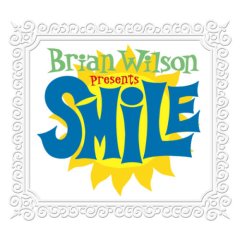
Brian Wilson Presents Smile is the fifth studio album by American musician Brian Wilson, released on September 28, 2004 on Nonesuch. It features all-new recordings of music that he had originally created for Smile, an unfinished album by the Beach Boys that he abandoned in 1967. Revisiting Smile was an intense emotional undertaking for Wilson, as he had been deeply traumatized by the circumstances that had originally surrounded the project.

Smiley Smile is the twelfth studio album by the American rock band the Beach Boys, released on September 18, 1967. Conceived as a simpler and more relaxed version of their unfinished Smile album, Smiley Smile is distinguished for its homespun arrangements, "stoned" aesthetic, and lo-fi production. Critics and fans generally received the album and its lead single, "Heroes and Villains", with confusion and disappointment. The album reached number 9 on UK record charts, but sold poorly in the U.S., peaking at number 41—the band's lowest chart placement to that point.
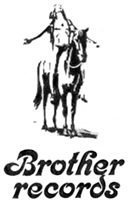
Brother Records, Inc. (BRI) is an American holding company and record label established in 1966 that owns the intellectual property rights of the Beach Boys, including "The Beach Boys" trademark. It was founded by brothers Brian, Carl and Dennis Wilson, and their cousin Mike Love. As of 2011, the corporation was equally owned by four shareholders and directors: Brian Wilson, Mike Love, Al Jardine, and the estate of Carl Wilson.

"Good Vibrations" is a song by the American rock band the Beach Boys that was composed by Brian Wilson with lyrics by Mike Love. It was released as a single on October 10, 1966, and was an immediate critical and commercial hit, topping record charts in several countries including the United States and the United Kingdom. Characterized by its complex soundscapes, episodic structure and subversions of pop music formula, it was at the time the most expensive single ever recorded. "Good Vibrations" later became widely acclaimed as one of the finest and most important works of the rock era.
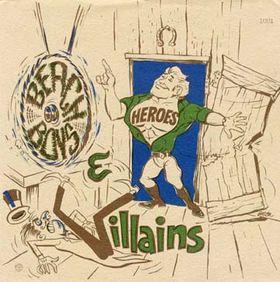
"Heroes and Villains" is a song by the American rock band the Beach Boys from their 1967 album Smiley Smile and their unfinished Smile project. Written by Brian Wilson and Van Dyke Parks, Wilson envisioned the song as an Old West-themed musical comedy that would surpass the recording and artistic achievements of "Good Vibrations". The single was Brother Records' first release. While it failed to meet critical and commercial expectations, it was nevertheless a hit record, peaking at number 12 in the U.S. and number 8 in the UK.
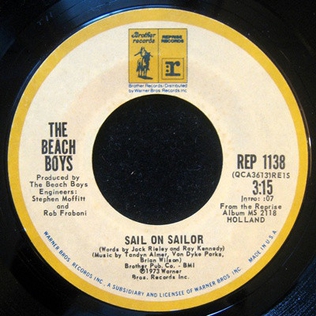
"Sail On, Sailor" is a song by American rock band the Beach Boys from their 1973 album Holland. It was written primarily by Van Dyke Parks and Brian Wilson with Ray Kennedy, Tandyn Almer, and Jack Rieley. The lead singer on the song is Blondie Chaplin, making this one of the band's few well-known songs not sung by Mike Love, Brian Wilson or Carl Wilson. The song was released as a single in 1973, backed with "Only with You", and peaked at No. 79 on the Billboard singles chart. A 1975 reissue charted higher, at No. 49.

"Surf's Up" is a song recorded by the American rock band the Beach Boys that was written by Brian Wilson and Van Dyke Parks. It was originally intended for Smile, an unfinished Beach Boys album that was scrapped in 1967. The song was later completed by Brian and Carl Wilson as the closing track of the band's 1971 album Surf's Up.
"Wonderful" is a song by the American rock band the Beach Boys from their 1967 album Smiley Smile and their unfinished Smile project. Written by Brian Wilson and Van Dyke Parks, it was their only collaboration that resulted in a love song, telling the story of a young girl's sexual awakening and its disruption of her devotion to God and her parents.
"Our Prayer" is a wordless hymn by the American rock band the Beach Boys from their 1969 album 20/20 and their never-finished Smile project. Composed by Brian Wilson, it was originally planned to be the introductory track on Smile. He later rerecorded the piece for his 2004 version of Smile in medley with the 1953 doo-wop standard "Gee".

"Cabinessence" is a song by the American rock band the Beach Boys from their 1969 album 20/20 and their unfinished Smile project. Written by Brian Wilson and Van Dyke Parks, Wilson described the song as a "rock and roll waltz" about railroads, while Parks offered that the pair were attempting to write a song that would end on "a freeze frame of the Union Pacific Railroad". The instrumentation includes banjo, cello, dobro, bouzouki, fuzz bass, trumpet, accordion, and percussion that was arranged to sound like the pounding of rail spikes.
"Wind Chimes" is a song by the American rock band the Beach Boys from their 1967 album Smiley Smile and their unfinished Smile project. Written by Brian Wilson and Van Dyke Parks, it was inspired by wind chimes hanging outside Wilson's home and was one of the first pieces tracked for the Smile sessions.
"Vegetables" is a song by American rock band the Beach Boys from their 1967 album Smiley Smile and their unfinished Smile project. Written by Brian Wilson and Van Dyke Parks, the song was conceived by Wilson as a tongue-in-cheek promotion of organic food. Another reported inspiration for the song was a humorous comment Wilson heard about the effect of marijuana turning him and his friends into a "vegetative" state.
"Fire" is an instrumental by American musician Brian Wilson that he originally composed for the Beach Boys' unfinished album Smile. Named after Catherine O'Leary and the Great Chicago Fire, the track was originally conceptualized as part of "The Elements", a four-part movement based on the four classical elements: Air, Fire, Earth, and Water. Wilson's friends, family, and colleagues later referred to its recording as heralding his period of psychosis and the unraveling of the Smile project.
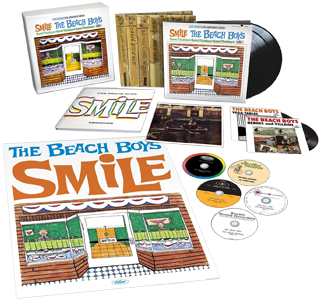
The Smile Sessions is a compilation album and box set recorded by American rock band the Beach Boys, released on October 31, 2011, by Capitol Records. The set is the follow-up to The Pet Sounds Sessions (1997), this time focusing on the abandoned recordings from the band's unfinished 1966–1967 album Smile. It features comprehensive session highlights and outtakes, with the first 19 tracks comprising a hypothetical version of the completed Smile album.
"Child Is Father of the Man" is a song by American rock band the Beach Boys that was written by Brian Wilson and Van Dyke Parks. It was originally recorded for the band's never-finished album Smile. In 2004, Wilson rerecorded the song for Brian Wilson Presents Smile. In 2011, the Beach Boys' original recording was released on The Smile Sessions.

Smile is an unfinished album by the American rock band the Beach Boys that was intended to follow their 1966 album Pet Sounds. It was to be an LP of twelve tracks assembled from modular fragments, the same editing process used for their "Good Vibrations" single. Instead, after a year of recording, the album was shelved and the group released a downscaled version, Smiley Smile, in September 1967. Over the next four decades, few of the original Smile tracks were officially released, and the project came to be regarded as the most legendary unreleased album in popular music history.

Michael Vosse was an American journalist and A&M Records publicist. He is best known as assistant to Brian Wilson during the formation of the Beach Boys' Brother Records and the recording of the album Smile (1966–67). His work also included limited time serving as a television producer, and narrator.

Lei'd in Hawaii is an unfinished live album by the American rock band the Beach Boys that was produced shortly after the completion of their 1967 studio album Smiley Smile. It was initially planned to include the band's first live concert performances since their tour of Europe in May 1967.
"Holidays" is an instrumental by the American rock band the Beach Boys that was composed by Brian Wilson for their never-finished Smile album. In 2003, it was rewritten with new lyrics by Van Dyke Parks as "On a Holiday" for the project Brian Wilson Presents Smile (2004).












